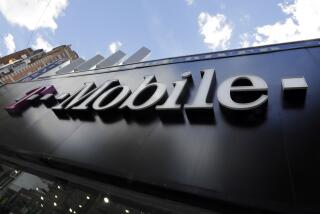Sprint Supports Asian, Latino Program : Telecommunications: The long-distance company will help teach new residents how to use the telephone.
Sprint, the nation’s third-largest long-distance company, is teaming up with a government agency and one of the industry’s leading critics to develop a program that would teach new Asian and Latino residents how to use the telephone.
Sprint will finance the effort, which includes a $35,000 contribution for San Francisco-based Consumer Action to develop and distribute fact sheets on such topics as using 911 and how to protect yourself against telephone fraud. The fact sheets will be printed in English, Chinese, Korean and Spanish.
The alliance, announced at a press conference in San Francisco last week, is noteworthy because it unites Sprint with Consumer Action, a respected consumer watchdog that is often critical of long-distance companies.
Only a few weeks ago, Consumer Action caused a stir with a price survey that showed long-distance rates had crept upward for the first time since the breakup of American Telephone & Telegraph eight years ago. Sprint’s phone rates showed the highest increase.
Ken McEldowney, executive director of Consumer Action, said that while he feels a “small amount of discomfort” with the partnership, he is “mostly comfortable with it.” The fact sheets will be free of promotional messages, he said, although Sprint’s name will be printed on them.
“It is impossible to deny that someone who sees such a pamphlet won’t end up thinking of Sprint when he makes a decision about a long-distance carrier down the road,” McEldowney acknowledged.
But McEldowney said that without Sprint’s financial support, it would be impossible for Consumer Action to conduct the program. “We don’t have the money, pure and simple.”
Dave Schmieg, president of Sprint’s consumer services group, said the company teamed up with Consumer Action because of its expertise in dealing with non-English speaking consumers on telephone issues. Schmieg said he expected the project to raise consumer awareness of Sprint, although he emphasized that “this is not a marketing ploy.”
“We don’t have the same brand identification with consumers as our competitors,” Schmieg said. “It may help people become more familiar with Sprint . . . and remember Sprint as a company that was helpful in getting information to them.”
The program is in response to a survey commissioned by Sprint that showed Asians and Latinos in six cities, including Los Angeles, are confused about how to contact emergency services, are not familiar with local or long-distance companies and are apprehensive about using the telephone. The U.S. Office of Consumer Affairs is also a partner in the program.
More to Read
Inside the business of entertainment
The Wide Shot brings you news, analysis and insights on everything from streaming wars to production — and what it all means for the future.
You may occasionally receive promotional content from the Los Angeles Times.










